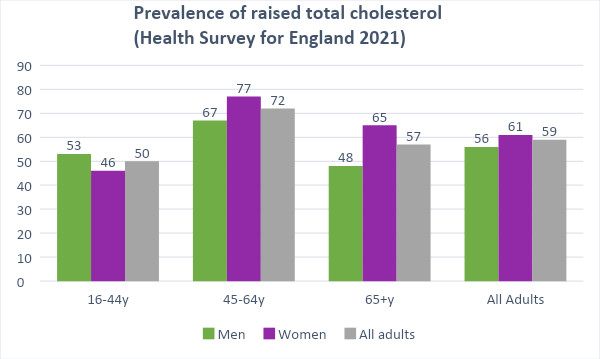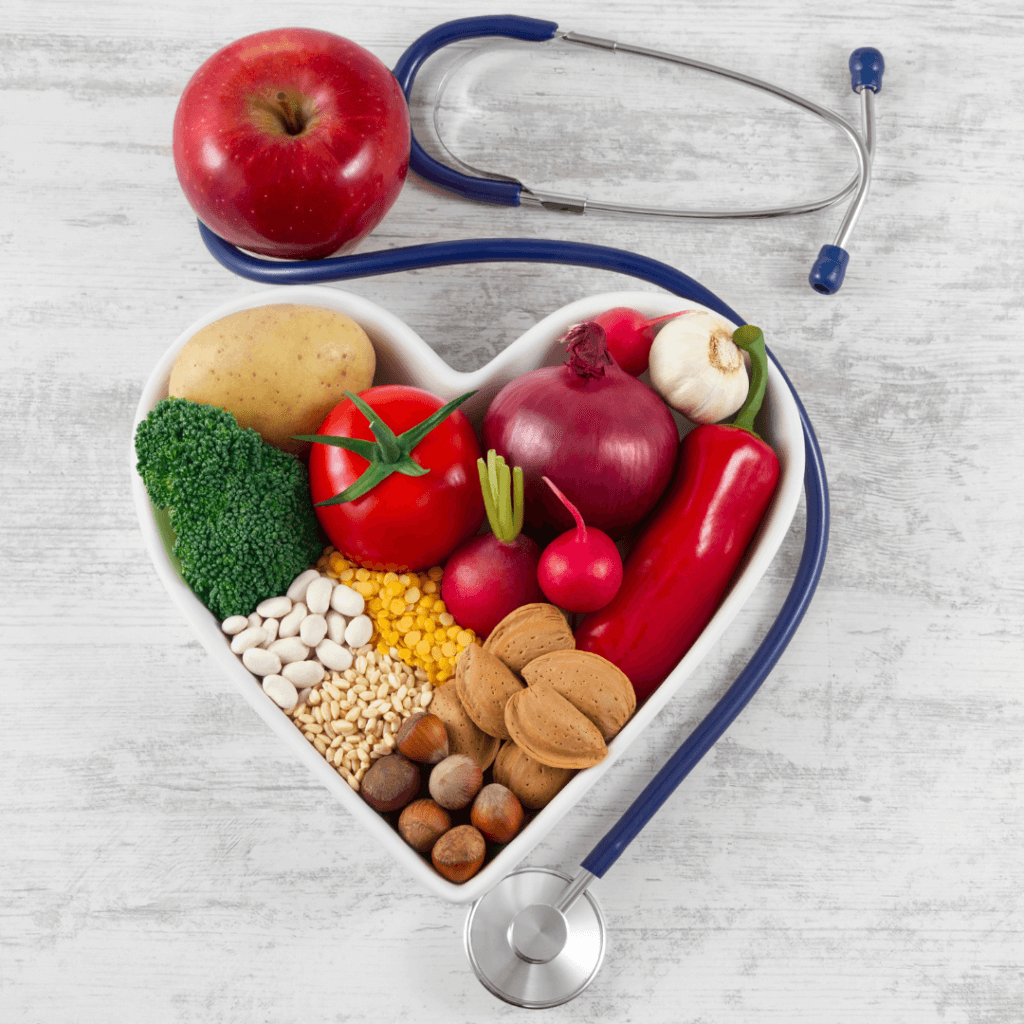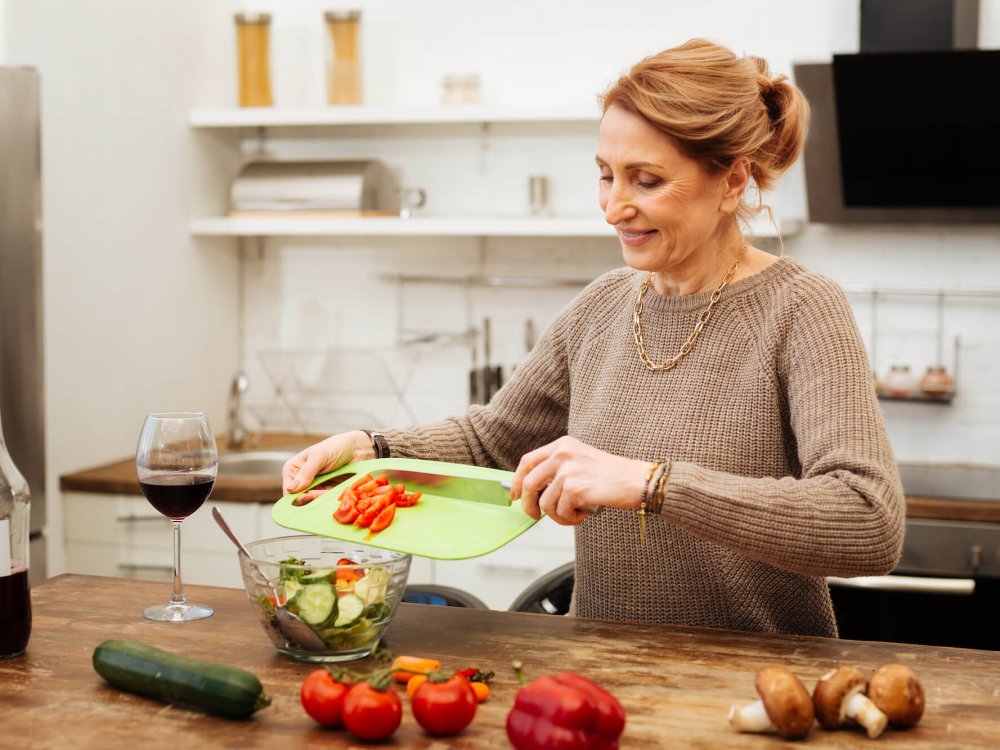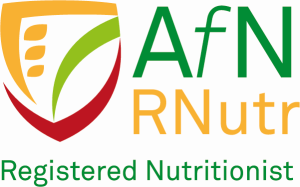Heart disease is often thought of as something that affects men more. Actually, it’s something that women, especially peri- and post-menopausal women should think about. You may be surprised to hear that 77% of women aged 45 to 64 years have raised cholesterol. The figure for men in this age group is 67%. (HSE, 2023)
Raised cholesterol is a significant risk factor for cardiovascular disease, including narrowing of the arteries (atherosclerosis), heart attack and stroke.
If you have raised cholesterol, there are many small changes you can make to your diet that can help you move back to a healthier blood cholesterol level. I share six dietary changes below along with a few practical suggestions which I hope will be useful.

Note: Raised total cholesterol is a total cholesterol that is greater than or equal to 5mmol/L
6 small dietary changes to help lower your cholesterol

1. Include more wholegrains and fibre-rich foods
Many adults do not get enough fibre. In Scotland, only 5% of women meet the 30g daily fibre recommendation. (FSS, 2022) Eating more wholegrain foods has been shown to reduce the risk of cardiovascular disease. Including at least 3 servings a day of wholegrain foods is thought to provide the greatest benefit. Oats and barley are particularly beneficial for lowering cholesterol as they contain beta-glucan – a type of soluble fibre that helps lower cholesterol.
Suggested small dietary changes:
- Have overnight oats or porridge for breakfast, or include a few handfuls of oats in your breakfast smoothie
- Swap white rice and pasta to brown rice and whole wheat pasta
- Opt for wholemeal bread or wraps wherever possible
2. Opt for heart-healthy fats
We need some fat in our diet to help us absorb fat-soluble vitamins (vitamins A, D, E and K) and for maintaining healthy cell structures, brain health and making hormones. However, reducing your intake of saturated fats and instead opting for foods that include heart healthy un-saturated fats should benefit your cholesterol levels. In practice, this means, less fatty meats, butter, ghee, palm and coconut oil and any products made using these (i.e. pastries, croissants, sausage rolls, fried foods, cakes and biscuits).
Instead, opt for olive oil or rapeseed oil, vegetable spreads, nuts, seeds, avocado, and oil-rich fish such as sardines, trout, pilchards and salmon.
Small dietary changes:
- Have an oil-rich fish 1-2 times a week
- Use soya single alternative to cream (useful when making a creamy soup, a sauce, or drizzling on fruit salad)
- Swap pastries or doughnuts for a fruit scone or an oaty biscuit.
3. Prioritise plant proteins
Including more plant protein foods such as lentils, beans peas, QuornTM, soya, nuts and seeds help to reduce the quantity of animal foods. As well as providing protein, they are naturally low in saturated fat whilst providing heart-healthy unsaturated fats and fibre. Including 1-2 portions of soya foods a day may be particularly useful for peri-menopausal women as they are naturally rich in plant oestrogens (phytoestrogens) which may help reduce hot flushes for some women. Check out my blog post on soya foods.
You don’t have to avoid meat completely as it can be a really useful and nutrient dense food to include to help you get all the essential nutrients your body needs. Trim off visible fat, remove the skin from poultry and keep processed meats (ham, bacon, salami, and processed sausages) to a minimum.
Small dietary changes:
- Replace some or all of the meat in dishes such as curries, stir-fries and casseroles with beans, chickpeas, lentils, QuornTM, soya mince or tofu.
- Include 1 or 2 portions of soya foods a day (e.g soya milk or yoghurt alternative with your breakfast and an edamame bean hummus on oatcakes for an afternoon snack).
- Try out a new plant-based meal – one of my favourite vegetarian recipe books is Anita Bean’s book.
4. Eat at least 5-a-day fruit and veg
There is strong evidence that including at least 5 portions a day of fruit and veg is associated with a reduced risk of cardiovascular disease (Aune et al, 2017). As well as beneficial fibre, fruit and veg provide a variety of heart-healthy nutrients like vitamin C, carotenoids, potassium and antioxidants.
Adding in more fruit and veg to meals and snacks can help reduce or replace foods that are high in saturated fat, sugars and salt.
Small dietary changes:
- All types of fruit and veg count – fresh, frozen, canned or dried – so enjoy and add in whatever is affordable and available to you.
- Have a mixed salad as a starter or side bowl along with your dinner to help increase the amount and variety of veg.
- Have at least two different fruit or veg at each meal, and at least one snack that includes a fruit or veg during the day.
5. Have a portion of nuts each day
Replacing foods that are high in saturated fats with foods high in unsaturated fats, such as nuts, can help lower cholesterol. As well as providing cholesterol-lowering fats, nuts also contain protein, fibre, vitamin E, magnesium, potassium, zinc and copper that benefit heart health.
Nuts are relatively high in calories, but evidence shows that having one daily portion of nuts (30g or roughly a close handful) helps reduce total cholesterol and LDL cholesterol (also known as the ‘bad’ cholesterol), and is not associated with weight gain. (Kim et al, 2018)
Small dietary changes:
- For your daily portion, choose from almonds, pistachios, walnuts, pecans, cashews, peanuts, hazelnuts, Brazil nuts…variety is great for your gut microbiome too!
- Go for unsalted nuts and, if possible, opt for nuts with their skins still intact and unroasted (rather than roasted) as these contain additional nutrients.
- You could have a handful of nuts on top of yogurt, on a green veg salad or fruit salad, use them in baking (e.g. walnut muffins), or add (e.g. cashews) to a stir-fry.
6. Include foods with added plant stanols or sterols
Plant stanols and sterols are naturally found in plant foods like vegetable oils, seeds, grains and legumes. These compounds have a similar chemical structure to cholesterol so they partially block some cholesterol absorption. This has the effect of lowering the amount of cholesterol in the blood.
For those who don’t have high blood cholesterol, there is no real benefit taking these products. If you do have raised blood cholesterol, an intake of 1.5g – 3g of plant stanols and sterols per day can help reduce cholesterol.
Small dietary changes:
- Have one sterol/stanol-fortified mini yoghurt drink or fortified yoghurt each day, along with a meal OR 3 servings of sterol/stanol-fortified skimmed milk or spread per day.
In my nutrition practice, I’ve helped many individuals to reduce their high cholesterol by making effective and sustainable dietary changes. I was delighted to work with Heart UK to highlight how small dietary changes can help reduce cholesterol – check out Lisa’s story, Beya’s story and Ross and Agata’s story as examples of individuals I supported through online nutrition consultations to reduce their cholesterol levels. Get in touch if you like help making effective dietary changes to improve your heart health.











